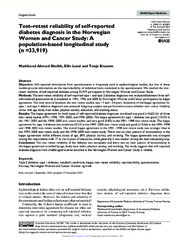Test–retest reliability of self-reported diabetes diagnosis in the Norwegian Women and Cancer Study: A population-based longitudinal study (n = 33,919)
Permanent lenke
https://hdl.handle.net/10037/8804Dato
2016-01-21Type
Journal articleTidsskriftartikkel
Peer reviewed
Sammendrag
Objective: Self-reported information from questionnaires is frequently used in epidemiological studies, but few of these
studies provide information on the reproducibility of individual items contained in the questionnaire. We studied the test–
retest reliability of self-reported diabetes among 33,919 participants in Norwegian Women and Cancer Study.
Methods: The test–retest reliability of self-reported type 1 and type 2 diabetes diagnoses was evaluated between three selfadministered
questionnaires (completed in 1991, 1998, and 2005 by Norwegian Women and Cancer participants) by kappa
agreement. The time interval between the test–retest studies was ~7 and ~14 years. Sensitivity of the kappa agreement for
type 1 and type 2 diabetes diagnoses was assessed. Subgroup analysis was performed to assess whether test–retest reliability
varies with age, body mass index, physical activity, education, and smoking status.
Results: The kappa agreement for both types of self-reported diabetes diagnoses combined was good (⩾0.65) for all three
test–retest studies (1991–1998, 1991–2005, and 1998–2005). The kappa agreement for type 1 diabetes was good (⩾0.73) in
the 1991–2005 and the 1998–2005 test–retest studies, and very good (0.83) in the 1991–1998 test–retest study. The kappa
agreement for type 2 diabetes was moderate (0.57) in the 1991–2005 test–retest study and good (⩾0.66) in the 1991–1998
and 1998–2005 test–retest studies. The overall kappa agreement in the 1991–1998 test–retest study was stronger than in
the 1991–2005 test–retest study and the 1998–2005 test–retest study. There was no clear pattern of inconsistency in the
kappa agreements within different strata of age, BMI, physical activity, and smoking. The kappa agreement was strongest
among the respondents with 17 or more years of education, while generally it was weaker among the least educated group.
Conclusion: The test–retest reliability of the diabetes was acceptable and there was no clear pattern of inconsistency in
the kappa agreement stratified by age, body mass index, physical activity, and smoking. The study suggests that self-reported
diabetes diagnosis from middle-aged women enrolled in the Norwegian Women and Cancer Study is reliable.
Beskrivelse
Published version. Source at http://doi.org/10.1177/2050312115622857.


 English
English norsk
norsk